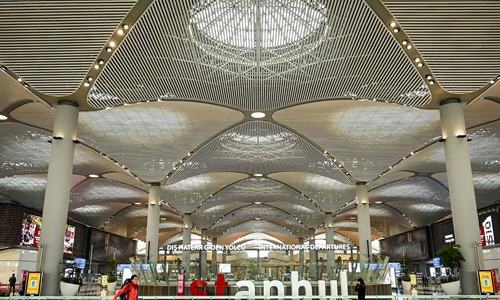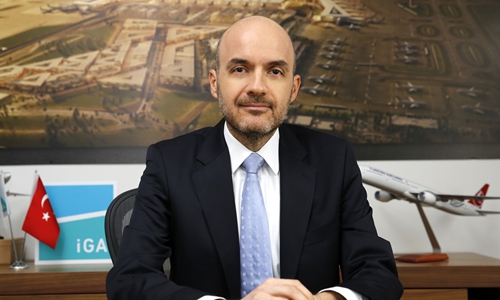HOME >> BUSINESS
Istanbul Airport signs MOUs with airports in Beijing
By Tu Lei Source:Global Times Published: 2019/11/14 20:33:40
Cooperation emphasized in a push for increased tourism between the two countries

Passengers walk through the new hall of Istanbul Airport on April 6. Photo: VCG

Kadri Samsunlu, CEO of iGA Airport Operations Photo: Courtesy of iGA Airport Operations
On Tuesday, the new Beijing Daxing International Airport (BDIA) signed a memorandum of understanding (MOU) with Istanbul Airport in a bid to promote partnership and cooperation between the two airports.The signature of the MOU followed the opening of BDIA in September.
According to the MOU, the two parties agreed to establish mechanisms for interactive contact and knowledge sharing, organize rotation training for employees of both airports, undertake joint marketing promotion, and promote direct flights between the airports for the benefit of travelers from around the world.
There is a common language between BDIA and Istanbul Airport, and the agreement will help promote the opening of the new routes, benefit the two aviation markets, and will also promote economic, cultural and tourism exchanges between the two countries, said Yao Yabo, general manger of the BDIA Management Center.
"We signed three MOUs with airports in Beijing and Shanghai, sharing IT, operation, customer experience and commercial cooperation," Kadri Samsunlu, CEO of iGA Airport Operations, said in an exclusive interview with the Global Times on Wednesday night.
This is also the first time Istanbul Airport has visited an overseas airport since it opened fully earlier this year, Samsunlu said. "The cooperation is attributed to the fact that China is important for Turkey and [numbers of] Chinese tourists keep growing in Turkey."
Istanbul Airport
In the past 20 years, Turkey has invested a lot in the aviation industry, as the number of airports has increased from 26 to 56. According to the data of Istanbul Provincial Directorate of Culture and Tourism in 2018, the number of foreign tourists arriving at Istanbul increased 24 percent, compared to the previous year.
Istanbul Airport strengthens Istanbul, the center of a vast geography from the East to the West, with its high capacity, various facilities and sound infrastructure opportunities.
Istanbul Airport launched flights to a total of 146 destinations on various continents, connecting more than 120 countries. When the airport is put into operation at full capacity, the number of destinations will exceed 350.
Since its full opening in April this year, the Istanbul Airport, as the intersection of Asia, Europe and the Middle East has carried a total of 43,845,302 passengers on national and international routes and operated a total of 268,735 flights by Wednesday, according to data provided by the Istanbul Airport.
Many agreements have been made at Istanbul Airport, from airlines to cargo, and from services to retail.
Performance of Chinese carriers
Currently there are two airlines flying from China to Istanbul Airport, Sichuan Airlines and China Southern, with 9 flights per week.
Next summer, it could have two more, as Juneyao Airlines and China Eastern Airlines are expected to open further routes to Istanbul.
Turkish Airlines began flights to China in 1999, starting with Beijing as their first destination.
The airline is now celebrating its 20th year in China, and is connecting Xi'an to its flight network as its fifth destination in China after Beijing, Shanghai, Guangzhou and Hong Kong.
Xi'an flight frequencies will initially be three per week. Flights are set to commence at the end of 2019 and then to increase gradually as the 2020 summer schedule begins.
With the launch of Xi'an flights, Turkish Airlines' reciprocal flights to China will get increased.
Last year was the year of tourism in Turkey. The Turkish government has carried out activities in more than 60 cities in China, making the number of Chinese tourists in Turkey increase about 60 percent compared with 2017.
There were 400,000 travelers from China to Turkey in 2018; this year that number is expected to reach 490,000, and the airport hopes to make it to 1 million in five years, Samsunlu said. "To reach the target, Turkish carriers and Chinese carriers [need to] increase their frequencies," he said.
However, attracting more travelers poses a considerable challenge ahead.
Apart from promoting the both cities' image, both countries should ease visa registration procedures, he said.
Posted in: INDUSTRIES,COMPANIES